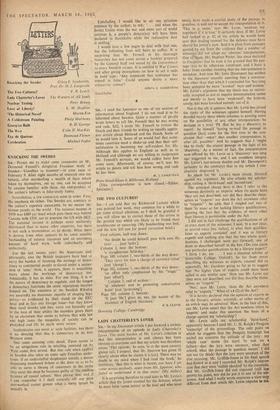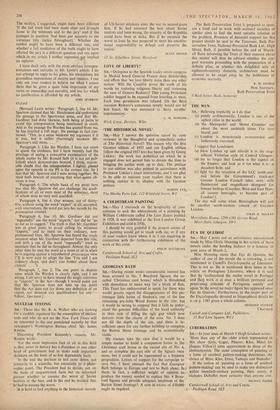LADY CHATTERLEY'S LOVER
SIR.—In my Encounter article I put forward a certain interpretation of an episode in Lady Chatter ley's Lover. The main burden of Mr. Levin's criticism is that this interpretation is and always has been obvious to everyone and that my article was therefore otiose. 'This episode,' he says, 'is at the most cursory glance (all, I suspect, that Mr. Sparrow has given it) clearly about what he claims it is [sic]. There was no doubt in my mind when I had read the book,' he continues, 'that this is what is meant, nor have I yet come across anybody, apart from Mr. Sparrow, who failed to understand it in that sense.' (My italics.)
It is surprising therefore to read later in Mr. Levin's article that the junior counsel for the defence, whom he must have 'come across' at the trial and who must surely have made a careful study of the passage in question, is said not to accept my interpretation of it. 'This in a sense,' says Mr. Levin, 'weakens my argument if it is true.' It certainly does. If Mr. Levin had looked at p. 42 of my article he would have seen that leading counsel for the defence must have shared his junior's view. And it is plain from passages quoted by me from the evidence that a number of witnesses did not adopt my 'obvious' interpretation. One of`them, Mr. Stephen Potter, has since declared in Encounter that he took it for ranted that the pas- sage was to be otherwise construed; and I have a letter from another insisting that my interpretation is mistaken. And now Mr. John Davenport has written to the Spectator roundly asserting that a construc- tion other than that which I contended for 'has long been accepted by most "narmal" men and women.' Mr. Levin's argument that my thesis was so univer- sally accepted as not to require demonstration seems not merely to have been 'weakened': the bottom, surely. has been knocked entirely out of it.
Nor is this all; it appears that Mr. Levin has joined the ranks of the witnesses against himself. Having devoted nearly three whole columns to pouring scorn on the possibility of any other interpretation, he declares in a brief 'PS that he has a discovery to report: he himself 'having re-read the passage in question [has] come for the first time to the con- clusion that--what? that another interpretation is, after all, possible! And he suggests that I 'might like to study' the crucial passage in the light of his 'discovery.' As a matter of fact, the interpretation now offered by Mr. Levin as a 'discovery' was long ago suggested to me, and I am confident (despite Mr. Levin's last-minute doubts and Mr. Davenport's certainty to the contrary) that in my article I con- clusively disproved it.
So much for Mr Levin's main attack, directed against my argument. He also attacks my scholar- ship, calling it 'third-hand' and 'second-rate.'
The principal charge here is that I refer to the witnesses derisively as 'experts' when (to quote him) 'they are not described, nor did they describe them- selves as "experts" nor does the Act anywhere refer to "experts" '; he adds that I 'singled out' two of them 'to sneer at for lacking literary qualifications, ignoring the fact that the evidence of merit other than literary is permissible under the Act.
I did not in fact challenge the qualifications of all or even most of the witnesses; I said, 'It is not clear, in several cases [my italics], in what their qualifica- tions as experts consisted' and it was as literary experts and nothing else that the two whose quali- fications I challenged were put 'forward; one of them so described herself in the box ('Do you claim any particular qualifications to be a literary expert?' 'I think I do, yes . . . I was a classical scholar at Somerville College, Oxford'). So far from never describing the witnesses as experts, counsel did so repeatedly, Mr. Gardiner going so far as to suggest that 'No higher class of experts could have been called in any similar case.' How can Mr. Levin say :they were not described, nor did they describe them- selves, as "experts" "?
'Nor,' says Mr. Levin, 'does the Act anywhere refer to "experts."' What of s.4 (2) of the Act?
'It is hereby declared that the opinion of experts as to the literary, artistic, scientific, or other merits of an article may be admitted.' How, in the face of this, can Mr. Levin assert that the Act nowhere refers to 'experts' and make this assertion the basis of a charge against my 'scholarship'?
Mr. Levin calls my scholarship 'third-hand,' apparently because I used Mr. C. H. Rolph's Penguin 'transcript' of the proceedings. The only point on which he suggests that the Penguin transcript has misled me concerns the attitude of the jury: my 'whole case' seems (he says) 'to rest on a fallacy—that the jury were unaware, when they retired, what the passage in question meant.' I did not say (or think) that the jury were unaware of the true meaning; Mr. Griffith-Jones in his final speech had hinted at it and I recorded Mr. Rolph's impres- sion that they were 'visibly shocked' by the innuendo. But Mr. Griffith-Jones did not expound (still less prove) his point, nor did he put it to any of the wit- nesses. And what I really wrote expresses a view vegy different from that which Mr. Levin imputes to me.
The verdict, I suggested, might have been different 'If the full truth had been made clear and brought home to the witnesses and to the jury' and if the passages in question 'had been put squarely to the witnesses [my italics throughout].' Whether the verdict ought to have been a different one, and whether a full revelation of the truth ought to have affected the jury is a different question and one upon
which in my article I neither expressedopt. implied
a, A
an opinion.
I have dealt only with the most obvious misrepre- sentations and untruths in Mr. Levin's article. I do not attempt to reply to his gibes, his innuendoes, his groundless imputations of motive and opinion. I can only ask your readers to believe me when I assure them that he gives a quite false impression of my views on censorship and morality, and one for which no justification is afforded by my article.
Oxford
JOHN SPARROW [Bernard Levin writes: 'Paragraph 2, line 10. Mr. Sparrow claimed that Mr. Hutchinson did understand the passage in the Sparrovian sense, and that Mr. Gardiner had done likewise, both being at pains to avoid this interpretation being mentioned in court. And in the passage the Warden has quoted from me, he has inserted a full stop: the passage in fact con- tinued, "This, in a sense weakens my argument if it is true, but it rather charmingly weakens Mr. Sparrow's still more. . . ."
Paragraph 3. Like the Warden, I have not room to quote the evidence, but I have recently had the privilege of seeing a exhaustive examination of the whole matter by Mr. Ronald Seth (it is not yet pub- lished) which demonstrates beyond, I think, reason- able doubt that the interpretation I lightly placed upon the episode in my PS is the correct one. So I fear that Mr. Sparrow and I were wrong together. We must both beware of assuming that what seems ob- vious is true.
Paragraph 6. The whole basis of my point here was that Mr. Sparrow did not challenge the quali- fications of all or even most of the witnesses, most of whom were so very well qualified.
'Paragraph 6, line 6. One witness, out of thirty- five, without using the word "expert" at all, accepted, with reservations, the word put into her mouth by the prosecution counsel.
'Paragraph 6, line 10. Mr. Gardiner did not "repeatedly" use the word "experts," nor did he "go so far as to suggest." The truth is that Mr. Gardiner was at great pains to avoid calling his witnesses "experts, and to insist on their ordinary, non- professional lives. Mr, Sparrow has found the single occasion when Mr. Gardiner departed from this rule, and with a use of the word "repeatedly" tried to maintain that he did so throughout. Almost the only other time he uses the word as a noun at all is when he is arguing against a hypothetical prosecution view ("It is very easy to adopt the line 'You and I are ordinary chaps, and don't you bother about these experts' . . .").
'Paragraph 7, line 2. The one point in dispute upon which the Warden is clearly right, and I am wrong. I am sorry to have missed the single reference to "experts" in the Act—though I would point out that Mr. Sparrow does not take up my point that the Act does not lay down any definition of an expert, nor demand any qualifications for one.'— Editor, Spectator.]



































 Previous page
Previous page